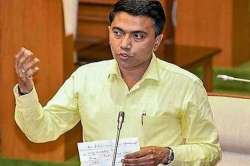Post Parrikar-era, Goa CM Pramod Sawant clears his first real test
For Sawant, who was appointed CM in March this year, days after the Model Code of Conduct came into force, his real administrative innings as Chief Minister begins now, but not before the party conducts a post mortem of the causes behind the two electoral debacles.

Chief Minister Pramod Sawant appeared to have fared well in his first real test in the Goa's post Parrikar era, pulling off a credible performance in the recently concluded Lok Sabha elections and Assembly bypolls, in which BJP won one Lok Sabha seat, lost another and also earned victories in three out of the four Assembly bypolls.
Faced with severe criticism for the sheer chaotic nature of coalition inherited from the Parrikar era, a paralysed mining industry, disenchantment among the cadre following Parrikar's death in March this year and a buoyant Congress, Sawant, along with the bullish state organising secretary Satish Dhond, in Parrikar's absence, managed to pull together a more than respectable showing on Thursday, when votes for the six electoral contests were counted.
While the 'crown jewel', the Panaji Assembly seat, held by the BJP since 1994 and one which bears Parrikar's familiar footprint was lost, the effort put by the CM and his team to lead the contest from the front, appears to have paid off in Sawant's first campaign as the head of the BJP-led coalition government.
Take the mining crisis for instance.
Right until the polls were declared, the BJP, especially its Union Minister of State for AYUSH and North Goa candidate Shripad Naik was badgered by members of the Goa Mining People's Front, a collective of out-of-work dependants on the mining industry, for doing little to revive the sector which was banned by the Supreme Court last year.
But an overwhelming outreach by the BJP, especially Sawant, who himself hails from Sanquelim Assembly constituency, which lies at the mining belt in North Goa and Dhond, managed to not only mitigate the electoral damage but also managed to snatch sizeable leads.
In Sanquelim and Mayem Assembly segments, BJP's Naik led Congress' Girish Chodankar by 7,081 and 8,941 votes.
The dissent in the mining belt did not reflect poorly in the BJP's vote pattern in both Lok Sabha constituencies.
Further up north, in the Sattari sub-district, questions were being raised as to whether Health Minister Vishwajit Rane, who had earlier this year quit the Congress to join the BJP and whose new-found commitment to the saffron party has been always viewed with suspicion by a section of the BJP state leadership, would really put his weight behind Naik.
Rane was effectively 'chaperoned' by Sawant and Dhong to draw more chunky leads for the BJP candidate in the constituencies of Valpoi, represented by Rane himself and Poriem, where his father is a Congress MLA.
The one blip on Sawant's radar was the Panaji Assembly seat, whose loss, the Chief Minister claimed, has "pained him".
The blame for this may well rest on the non-too-subtle manoeuvring by the state BJP leadership, to first prop Parrikar's son Utpal to contest the Panaji bypoll, only to unceremoniously drop him in favour of the late Defence Minister's former aide Kuncalienkar subsequently; a move which left a bad taste in the mouth for Parrikar's well-wishers in the city, as well as hardcore BJP foot-soldiers.
Utpal's comments last week at a book release function, in which Sawant was in attendance, offered a hint of the dissidence, which eventually toppled the BJP's efforts in Panaji.
Speaking about his late father's qualities of trust and the perils of letting one's faith down, Utpal said: "What are its side effects and how it can backfire, I came to know recently".
Despite the oblique critique, Sawant, for now, sits pretty. The addition of three MLAs to BJP's ranks takes the party's strength to 17 in the 40 member house. Along with coalition allies, the treasury benches occupy 23 MLAs, as compared to 20 earlier.
For Sawant, who was appointed CM in March this year, days after the Model Code of Conduct came into force, his real administrative innings as Chief Minister begins now, but not before the party conducts a post mortem of the causes behind the two electoral debacles.
"It is not always one wins 100 per cent. We won 75 per cent of the seats. So many other reasons are there for losing of the Panaji seat. We will do post mortem for that also. Next elections, we will win the Panaji seat," he said.